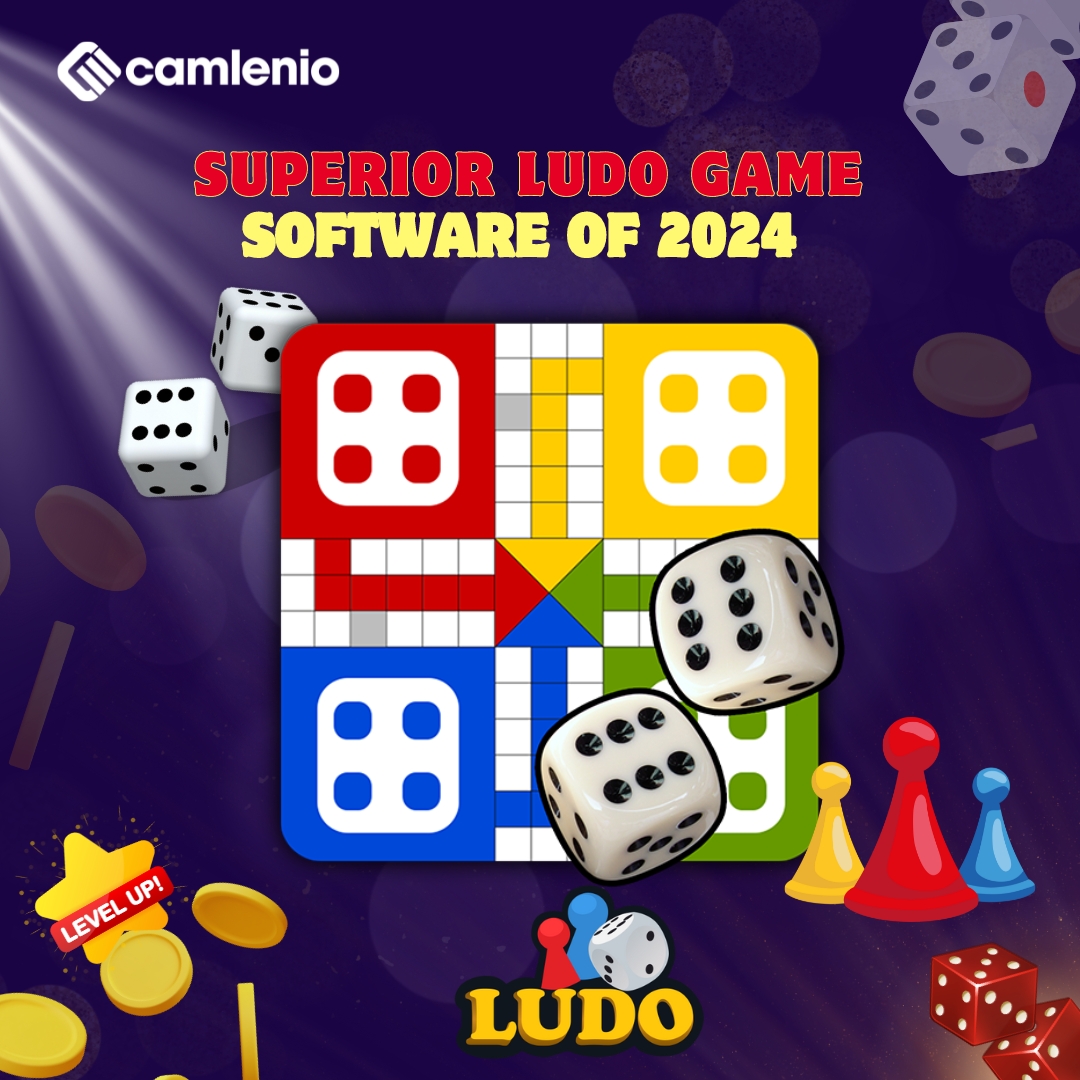In recent years, the mobile gaming industry has experienced tremendous growth, with more people turning to their smartphones for entertainment. One of the most popular games that have stood the test of time is Ludo. Its simple yet engaging gameplay has made it a favorite among players of all ages. If you’re considering developing a Ludo game app, this guide will provide you with everything you need to know to get started.
Introduction
Ludo, a classic board game, has stood the test of time and remains a popular choice for players of all ages. In recent years, the digital transformation has brought Ludo to the screens of smartphones and computers, making it more accessible than ever. At Camlenio, we specialize in game development, including the creation of Ludo game apps. In this article, we will explore the basics of Ludo game development, from the game’s history to its modern digital adaptation.
Features of Ludo Game Development Services:
- Daily Bonus: Players receive rewards or bonuses for logging in and playing the game regularly. This incentivizes players to engage with the game daily.
- Play with Friends: Players can invite their friends to join them in a game of Ludo, adding a social element to the gameplay and enhancing the overall experience.
- Players Chat: A chat feature allows players to communicate with each other during the game. This can be used for strategizing, friendly banter, or simply chatting while playing.
- Auto Move: This feature can be helpful for players who want to speed up the game. It automatically moves their tokens based on the dice roll, saving time and making the gameplay more fluid.
- Online/Offline Mode: Players can choose to play the game either online, connecting with other players over the internet, or offline, playing against computer-controlled opponents.
- Multi-Language Support: The game supports multiple languages, allowing players from different regions to enjoy the game in their preferred language. This can help in making the game more accessible and appealing to a wider audience.
Explore the Exciting Modes and Variations of Our Ludo Game Development
Ludo is a classic board game that has gained immense popularity in the digital world. Here are some exciting modes and variations of Ludo game development that can add a new dimension to the traditional game:
- Classic Mode: This mode follows the traditional rules of Ludo, where players race their tokens around the board to reach the center.
- Quick Mode: A faster-paced version of the game where players have fewer tokens and a smaller board, making the game more intense and quick to finish.
- Battle Mode: Players can engage in battles with other players’ tokens when they land on the same square, adding a strategic element to the game.
- Team Mode: Players can form teams and work together to race their tokens around the board, adding a cooperative aspect to the game.
- Online Multiplayer: Players can connect with friends or other players online and compete in real-time matches, adding a competitive edge to the game.
- Tournament Mode: Players can participate in tournaments with multiple rounds and compete against other players to win prizes and accolades.
- Customization: Players can customize their game boards, tokens, and rules to create a personalized gaming experience.
- Special Powers: Players can unlock special powers or abilities for their tokens, adding a unique twist to the game.
Read More : https://camlenio.com/blogs/the-power-of-flutter/
Admin Panel Features for a Ludo Game
- User Management: Admins can manage user accounts, including creating, editing, and deleting accounts, as well as resetting passwords.
- Game Management: Admins can manage game rooms, including creating new rooms, editing room settings, and closing rooms.
- Game Monitoring: Admins can monitor ongoing games, view game statistics, and manage game progress if needed.
- Content Management: Admins can manage game content, including adding new game boards, themes, or other customizable features.
- Analytics and Reporting: Admins can view analytics and reports on user activity, game performance, and other relevant metrics.
- Payment Management: If the game includes in-app purchases or other payment features, admins can manage payments, transactions, and user balances.
- Chat and Communication Management: Admins can manage chat features, including monitoring chat activity, blocking users, or filtering messages.
- Security: Admins can manage security settings, including setting up authentication methods, monitoring for suspicious activity, and enforcing security policies.
- Notifications: Admins can send notifications to users, such as announcements, updates, or promotional messages.
- Settings and Configuration: Admins can configure various game settings, such as game rules, scoring systems, or other game parameters.
Steps to Develop a Ludo Game App
- Conceptualization and Planning:
- Define the game’s objectives, target audience, and features.
- Create a wireframe or prototype to visualize the app’s layout and functionality.
- Choose the Development Platform:
- Decide whether to develop the app for iOS, Android, or both platforms.
- Select the appropriate programming languages and frameworks (e.g., Swift for iOS, Java/Kotlin for Android).
- Design the User Interface (UI):
- Create a visually appealing and intuitive UI design.
- Use colors, graphics, and animations that align with the Ludo game theme.
- Game Logic and Mechanics:
- Implement the game’s logic, including rules, dice rolling, and player movements.
- Ensure the game follows standard Ludo rules and supports multiplayer functionality.
- Backend Development:
- Set up a backend server to manage game sessions, player data, and matchmaking.
- Choose a suitable backend technology stack, such as Node.js, Django, or Firebase.
- Multiplayer Functionality:
- Implement real-time multiplayer functionality using sockets or APIs.
- Enable players to join or create game rooms and play against friends or random opponents.
- Integrate In-App Purchases and Ads:
- Include in-app purchases for virtual goods, coins, or ad removal.
- Integrate ads to monetize the app, such as interstitial, banner, or rewarded video ads.
- Testing and Quality Assurance (QA):
- Conduct thorough testing to identify and fix bugs, glitches, and performance issues.
- Test the app on different devices and screen sizes to ensure compatibility.
- Deployment and Distribution:
- Submit the app to the Apple App Store and/or Google Play Store for review and approval.
- Once approved, release the app to the public and monitor its performance and user feedback.
- Post-Launch Support and Updates:
- Provide regular updates to add new features, fix bugs, and improve user experience.
- Engage with the user community to gather feedback and address any issues promptly.
Future Trends in Ludo Game App Development
The future of Ludo game app development looks promising, with advancements in technology such as augmented reality (AR) and virtual reality (VR) likely to play a significant role. Integrating these technologies into your Ludo game app could provide a unique and immersive gaming experience for players.
Conclusion
Developing a Ludo game app can be a rewarding venture, with the potential to attract a large number of players and generate significant revenue. By following the steps outlined in this guide and staying informed about the latest trends and technologies, you can create a successful Ludo game app that stands out in the competitive mobile gaming market.
FAQs
- Can I develop a Ludo game app for both Android and iOS platforms? Yes, you can develop a Ludo game app that is compatible with both Android and iOS platforms using cross-platform development tools.
- What programming languages are commonly used to develop Ludo game apps? Popular programming languages for developing Ludo game apps include C++, C#, and Java.
- How can I monetize my Ludo game app? You can monetize your Ludo game app through in-app purchases, ads, and offering a premium version of the game.
- Is it necessary to conduct market research before developing a Ludo game app? Yes, conducting market research is essential to understand the competition and identify opportunities for differentiation.
- What are some key features to include in a Ludo game app? Key features to include in a Ludo game app include multiplayer mode, single-player mode, customization options, in-game chat, and leaderboards.

